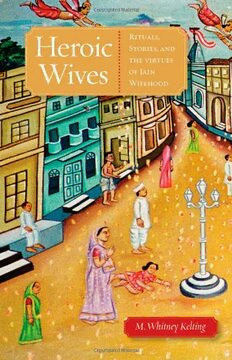
Heroic Wives Rituals, Stories and the Virtues of Jain Wifehood PDF
265 Pages·2009·2.499 MB·English
Most books are stored in the elastic cloud where traffic is expensive. For this reason, we have a limit on daily download.
Preview Heroic Wives Rituals, Stories and the Virtues of Jain Wifehood
Description:
Although in Hinduism it is mainly used to refer to widow immolation, the term 'sati' means 'true woman' - a female hero. Whitney Kelting has learned that in Jainism satis appear as subjects of devotional hymns. This seems paradoxical, given that Jain spirituality is to disengage oneself from worldly existence and Jain devotionalism is usually directed toward those souls who have reached perfect detachment. In fact, however, there is a vast corpus of popular texts, many of them written by prominent scholar-monks between the 16th and 18th centuries, illustrating the distinctly worldly virtues of devoted Jain wives. In this fieldwork-based study, Kelting explores the ways in which Jain women use sati narratives and rituals to understand wifehood as a choice, which these women's ongoing ritual practices continually shape. She focuses on eight well-known Jain sati narratives, recorded in both formal ritual contexts and in informal retellings, and also as read aloud from printed versions. She finds that one of the principal functions of Jain sati narratives is to contribute to a discourse of wifehood, which addresses the concerns of Jain laywomen within the Jain value system and provides a fertile context in which Jain women can explore their questions of virtue and piety.
See more
The list of books you might like
Most books are stored in the elastic cloud where traffic is expensive. For this reason, we have a limit on daily download.
